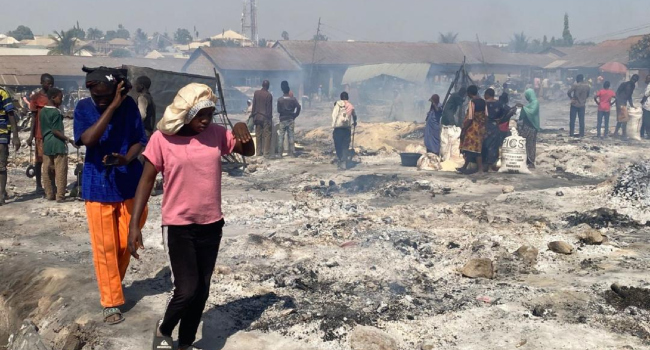The US state of Texas is bracing for the arrival of Tropical Storm Beryl, which is expected to reintensify to a hurricane.
Forecasters say the storm could bring destructive winds, storm surges and up to 25cm (10 inches) of rain when it makes landfall early on Monday local time.
Some of the state's largest ports have closed in preparation, while residents have been warned of widespread power outages.
Beryl caused at least 10 deaths in the Caribbean before being downgraded to a tropical storm as it hit Mexico's Yucatán Peninsula.
More than a million Texans were placed under a hurricane warning ahead of the storm's arrival.
It is expected to make landfall between the cities of Galveston and Corpus Christi and could reach Category 2 level, meaning that it could sustain winds of up to 177km/h (110mph).
The authorities say that even though it may not be as strong as it was in the Caribbean, it could still cause widespread power outages and disruption in Texas, as far inland as the city of Houston.
The director of the US National Hurricane Center, Michael Brennan, has warned those living in Beryl's path to find a safe place to be through Monday "as hazardous conditions will persist even after the centre of Beryl moves through".
"There's a very considerable risk of flash flooding across the Texas Gulf Coast, eastern Texas, ArkaTex [Arkansas-Texas] region.
"Do not ignore this very serious storm," urged Acting Governor Dan Patrick.
The ports of Corpus Christi, Houston, Galveston, Freeport and Texas City have all closed, meaning there could be a temporary halt to exports.
All vessel movement and cargo operations have been restricted.
Refugio County, north of Galveston, on Saturday issued a mandatory evacuation - stating the limited capacity of emergency services staff, 4 July holiday traffic and the area's weakened infrastructure from Hurricane Harvey in 2017 as reasons.
Nueces County, meanwhile, ordered the mandatory evacuation of visitors and strongly encouraged locals to leave as well.
More than 2,000 emergency responders have been made ready to deal with Beryl's aftermath, Mr Patrick announced, including members of the Texas National Guard.
According to US forecaster AccuWeather, landfalling hurricanes of this kind are somewhat rare for Texas in July.
Beryl is expected to move across America's central states, including Mississippi, later in the week.
Hurricane Beryl has been an unprecedented storm. At one stage, it became the earliest Category Five hurricane ever recorded.
It has already left a trail of devastation across the Caribbean - hitting islands including St Vincent and the Grenadines, Mayreau and Union, and Grenada especially hard.
The storm was also one of the most powerful to ever hit Jamaica and left hundreds of thousands of people without power.
Beryl brought heavy rain to the tourist hotspots of Cancún and Tulum in southern Mexico. No major damage was reported but the high winds felled trees and caused power outages.
While it is difficult to attribute specific storms to climate change as the causes are complex, exceptionally high sea surface temperatures are seen as a key reason why Hurricane Beryl has been so powerful.
It is the first hurricane of the 2024 Atlantic season but the US National Oceanic and Atmospheric Administration has warned that the North Atlantic could get as many as seven major hurricanes this year - up from an average of three in a season.

 5 months ago
7
5 months ago
7















 English (US) ·
English (US) ·